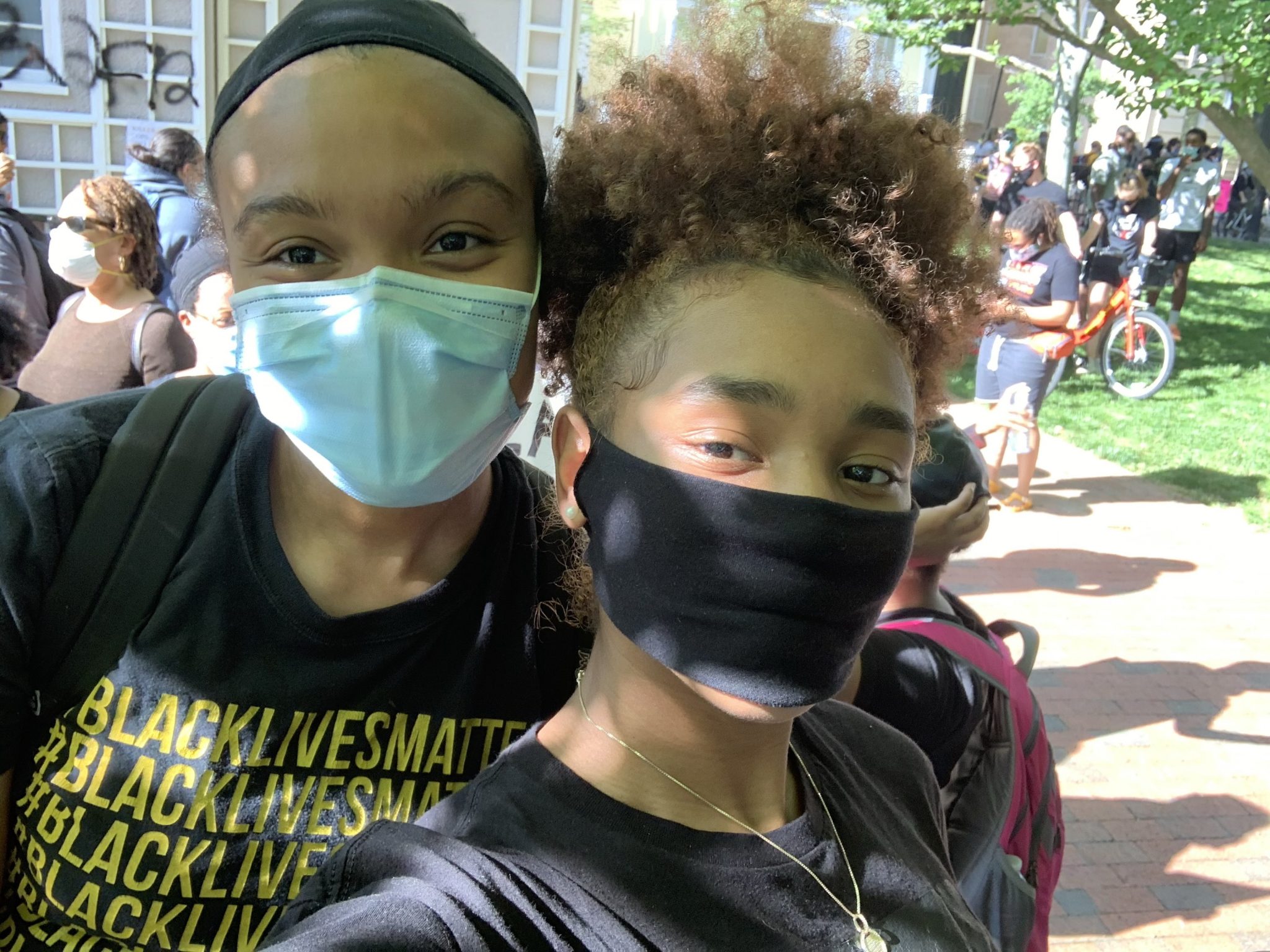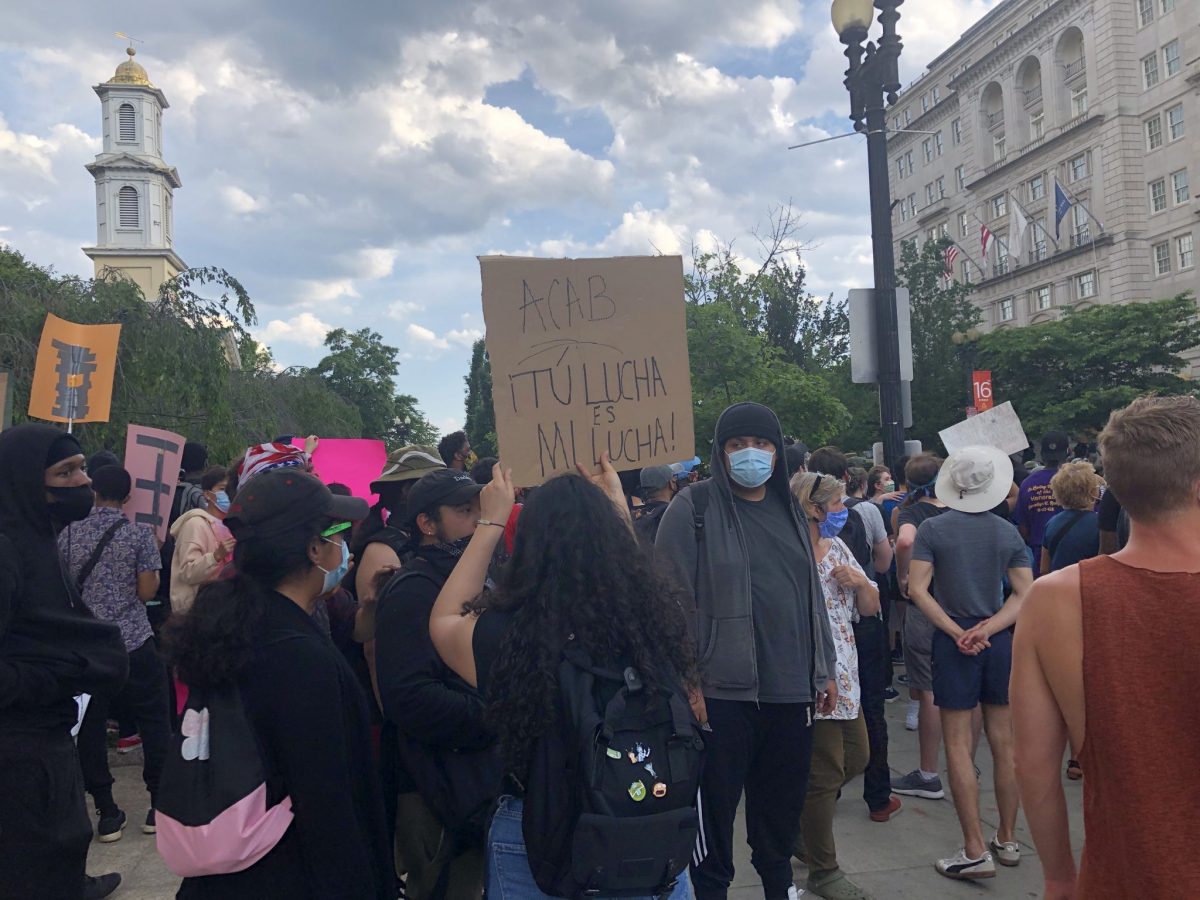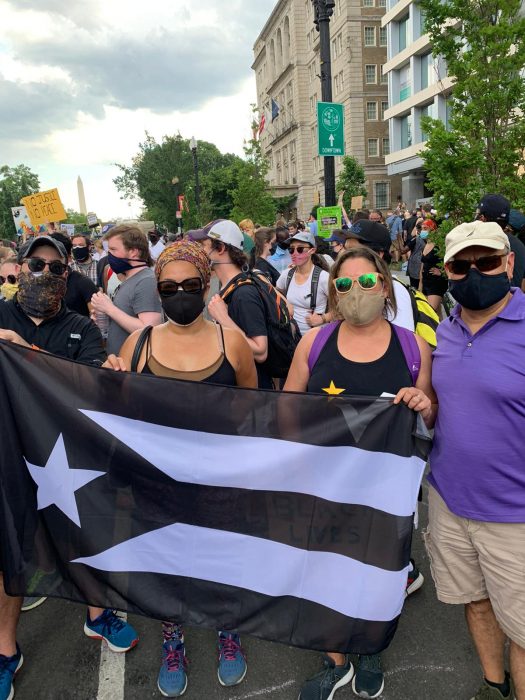

Johanna Figueroa (left) and Chelsea Figaro at a Black Lives Matter protest in D.C. earlier this month. (Photo courtesy of Chelsea Figaro)
WASHINGTON, D.C. — When 17-year-old Chelsea Figaro heard that the protests in response to the police killing of George Floyd had spread to the nation’s capital, she told her mom she had to go. To her surprise, her mom said yes.
“I feel like this is the generation for change,” said Figaro, who lives in Arlington, Virginia. “It didn’t just matter right now. It’s not a trend, you know?”
Figaro’s parents are Dominican, and she identifies as Afro-Latina. She said her mom typically doesn’t let her go to protests and tries to “sugarcoat” difficult topics when discussing current events with Figaro. But this time was different. Her mom immediately supported her idea of going to the protest, and even bought poster paper and markers for her to make her own signs. That was meaningful for Figaro, who has attended protests in D.C. almost every day over the past week.
“I’m very pro -Black and I’m very pro our people,” Figaro told Latino Rebels. “So for her [my mom] to finally understand that and for her to allow me to go and support me, this is when I knew. Like, change is coming.”
Figaro even convinced her mentor to go to the protests with her. Johanna Figueroa, who was Chelsea’s mentor in a middle-school college prep program over three years ago, had started limiting her news intake nearly a month ago, after learning of Ahmaud Arbery, a Black man who was shot and killed by white men while going for a jog.


Protestors in Washington, D.C. on June 6, 2020. Th sign reads, “ACAB” and “Tú lucha es mi lucha,” or “Your struggle is my struggle.” (Ana Lucía Murillo/Latino Rebels)
“I completely disconnected from social media because just to have that visual, if you’ve seen the video, it was very draining,” said Figueroa, who is a middle school teacher and also identifies as Afro-Latina.
So when Figaro invited her mentor to a protest about George Floyd, Figueroa wasn’t even aware that protests would be taking place due to the pandemic.
“Chelsea definitely inspired me to go back out there,” said Figueroa, who hadn’t been to a protest in about a year, despite regularly attending them in the past.
Figueroa worries about how deeply racism is ingrained in American society, and how “back to back” these high-profile killings of black people are. The first protest she ever attended was after Trayvon Martin was killed eight years ago. She was 17 at the time, the same age that her mentee Chelsea is now.
“It’s disheartening to see that I don’t think there’s too much structural change happening in the past eight years since my first protest,” Figueroa told Latino Rebels.
Protesters in downtown #DC Saturday afternoon June 6 marching and chanting “hands up, don’t shoot.” Video by @latinorebels correspondent @analuciamur. #protest #movementforblacklives #georgefloydprotests pic.twitter.com/cbQA5qhku6
— Latino Rebels (@latinorebels) June 6, 2020
Edil Sepúlveda, a 34-year-old Puerto Rican lawyer, was also emotional about the videos of police killing Black people. When he saw the video of Floyd, he couldn’t believe his eyes.
Sepúlveda moved to the Washington, D.C. area five years ago from Puerto Rico. He has been going to protests in D.C. and in nearby Alexandria for over a week, often with the group he co-founded, Boricuas Unidos en la Diáspora.


Edil Sepúlveda (far left) with the Puerto Rican resistance flag in black. (Courtesy of Edil Sepúlveda.)
“This is something we hear a lot. We see things similar to this, but just seeing it so graphic and the whole process, for me, more than sad, it was just angry,” Sepúlveda told Latino Rebels. “Angry because it has to end somehow. The police brutality and the racism and everything.”
The Latino community knows what it is to be oppressed by the United States government and by its citizens, Sepúlveda said. He pointed to racist incidents like the white woman in Wisconsin who recently harassed a Latino family for playing music in a park, as well as the inherently unequal nature of being Puerto Rican in the U.S.
“Even for Puerto Ricans, we have an added problem of this relationship with the United States—that it’s a colonial one that goes for more than 100 years,” Sepúlveda said. “I’m an advocate for more sovereignty and independence for Puerto Rico. My ancestors, my family that fought for that and us ourselves, we have been persecuted for those beliefs by the United States. Me, personally, when I’m going to these protests, I’m basically in solidarity with Black Americans.”
“We’re Black every day. We’re Black every day of the year,” Figaro said. “So we have to, we’re going to be the last generation that these people mess with.”
***
Ana Lucía Murillo is a journalist based in Washington, D.C. and the 2020 summer correspondent for Latino Rebels. She tweets from @analuciamur.


